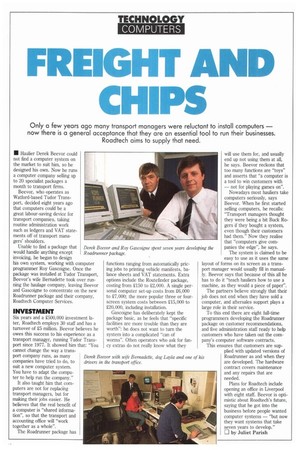FREIGHT AND CHIPS
Page 50

If you've noticed an error in this article please click here to report it so we can fix it.
• Haulier Derek Beevor could not find a computer system on the market to suit him, so he designed his own. Now he runs a computer company selling up to 20 specialist packages a month to transport firms.
Beevor, who operates as Watford-based Tudor Transport, decided eight years ago that computers could be a great labour-saving device for transport companies, taking routine administration work such as ledgers and VAT statements off of transport managers' shoulders.
Unable to find a package that would handle anything except invoicing, he began to design his own system, working with computer programmer Roy Gascoigne. Once the package was installed at Tudor Transport, Beevor's wife Bernadette took over running the haulage company, leaving Beevor and Gascoigne to concentrate on the new Roadrunner package and their company, Roadtech Computer Services.
INVESTMENT
It also taught him that computers are not for replacing transport managers, but for making their jobs easier. He believes that the real benefit of a computer is "shared information", so that the transport and accounting office will "work together as a whole".
The Roadrunner package has functions ranging from automatically pricing jobs to printing vehicle manifests, balance sheets and VAT statements. Extra options include the Routefmder package, costing from 2150 to 22,000. A single personal computer set-up costs from 26,000 to 27,000; the more popular three or fourscreen system costs between 215,000 to 220,000, including installation.
Gascoigne has deliberately kept the package basic, as he feels that "specific facilities are more trouble than they are worth": he does not want to turn the system into a complicated "can of worms". Often operators who ask for fancy extras do not really know what they will use them for, and usually end up not using them at all, he says. Beevor reckons that too many functions are "toys" and asserts that "a computer is a tool to win customers with — not for playing games on".
Nowadays most hauliers take computers seriously, says Beevor. When he first started selling computers, he recalls: "Transport managers thought they were being a bit Buck Rogers if they bought a system, even though their customers had them." Now they realise that "computers give companies the edge", he says.
The system is claimed to be easy to use as it uses the same layout of forms on its screen as a transport manager would usually fill in manually. Beevor says that because of this all he has to do it "teach hauliers how to use a machine, as they would a piece of paper".
The partners believe strongly that their job does not end when they have sold a computer, and aftersales support plays a large role in their service.
To this end there are eight full-time programmers developing the Roadrunner package on customer recommendations, and five administration staff ready to help customers who have taken out the com pany's computer software contracts. This ensures that customers are supplied with updated versions of Roadrunner as and when they are developed. The hardware contract covers maintenance and any repairs that are needed.
Plans for Roadtech include opening an office in Liverpool with eight staff. Beevor is optimistic about Roadtech's future, saying that he got into the business before people wanted computer systems — "but now they want systems that take seven years to develop." I El by Juliet Parish


























































































































